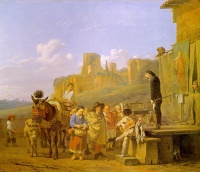Improvisation
From The Art and Popular Culture Encyclopedia
| Revision as of 21:13, 25 June 2023 Jahsonic (Talk | contribs) ← Previous diff |
Revision as of 21:19, 25 June 2023 Jahsonic (Talk | contribs) Next diff → |
||
| Line 8: | Line 8: | ||
| {{Template}} | {{Template}} | ||
| - | '''Improvisation''' is the [[practice]] of [[making]] in the moment and in response to the stimulus of one's immediate environment. This can result in the [[invention]] of [[new]] thought patterns, new practices, new structures or symbols, and/or new ways to act. This ''invention cycle'' occurs most effectively when the practitioner has a thorough ''[[intuitive]]'' or ''technical'' understanding of the necessary skills and concerns within the improvised domain. | + | '''Improvisation''', often shortened to '''improv''', is the [[activity]] of [[making]] or [[doing]] something not [[planned]] beforehand, using whatever can be found. Improvisation in the [[performing arts]] is a very [[spontaneous]] performance without specific or [[scripted]] [[preparation]]. The [[skills]] of improvisation can apply to many different faculties, across all artistic, scientific, physical, cognitive, academic, and non-academic disciplines. |
| + | |||
| + | Improvisation also exists outside the arts. Improvisation in engineering is to solve a problem with the tools and materials immediately at hand. [[Improvised weapon]]s are often used by guerrillas, insurgents and criminals. | ||
| - | The skills of improvisation can apply to many different abilities or forms of communication and expression across all artistic, scientific, physical, cognitive, academic, and non-academic disciplines. For example, [[music]], [[cooking]], presenting a [[speech (public address)|speech]], [[sales]], personal or romantic relationships, [[sports]], [[flower arranging]], [[martial arts]], [[psychotherapy]], [[the arts]], and much more. | ||
| ==Music== | ==Music== | ||
| :''[[free improv]]'' | :''[[free improv]]'' | ||
Revision as of 21:19, 25 June 2023

|
"Anyway, arising from an improvisatory beginning (both tragedy and comedy—tragedy from the leaders of the dithyramb, and comedy from the leaders of the phallic processions which even now continue as a custom in many of our cities)..."--Poetics by Aristotle "The original rappers, or MCs (from "Master of Ceremonies") would improvise rhymes over the beats created by the DJs."--Sholem Stein |
|
Related e |
|
Featured: |
Improvisation, often shortened to improv, is the activity of making or doing something not planned beforehand, using whatever can be found. Improvisation in the performing arts is a very spontaneous performance without specific or scripted preparation. The skills of improvisation can apply to many different faculties, across all artistic, scientific, physical, cognitive, academic, and non-academic disciplines.
Improvisation also exists outside the arts. Improvisation in engineering is to solve a problem with the tools and materials immediately at hand. Improvised weapons are often used by guerrillas, insurgents and criminals.
Music
Musical improvisation is usually defined as the spontaneous performance of music without previous preparation or any written notes. In other words, the art of improvisation can be understood as composing music "on the fly". There have been experiments by Charles Limb, using functional magnetic resonance imaging, that show the brain activity during musical improvisation. Limb showed increased activity in the medial prefrontal cortex, which is an area associated with an increase in self-expression. Further, there was decreased activity in the lateral prefrontal cortex, which is an area associated with self-monitoring. This change in activity is thought to reduce the inhibitions that normally prevent individuals from taking risks and improvising.
Improvisation can take place as a solo performance, or interdependently in an ensemble with other players. When done well, it often elicits gratifying emotional responses from the audience. One notable improvisational pianist is Franz Liszt. The origins of Liszt's improvisation in an earlier tradition of playing variations on a theme were mastered and epitomized by Johann Sebastian Bach, Wolfgang Amadeus Mozart, and Ludwig van Beethoven.
Notable improvisational musicians from the modern era include Keith Jarrett, an improvisational jazz pianist and multi-instrumentalist who has performed many improvised concerts all over the world.
Improvised freestyle rap is commonly practiced as a part of rappers' creative processes, as a "finished product" for release on recordings (when the improvisation is judged good enough), as a spiritual event, as a means of verbal combat in battle rap, and, simply, for fun. As mentioned above, studies have suggested that improvisation allows a musician to relax the control filters in their mind during this exercise. It often incorporates insults similar to those in the African-American game The Dozens, and complex rhythmic and sometimes melodic forms comparable to those heard in jazz improvisation.
In the realm of silent film music, there are a small number of musicians whose work has been recognized as exceptional by critics, scholars and audiences alike; these include Neil Brand and John Sweeney. Their performances must match the style and pacing of those films which they accompany and the knowledge of a wide range of musical styles is required, as well as the stamina to play for films which occasionally run more than three hours, without a pause.
Wiktionary
- The act or art of composing and making music, poetry, and the like, extemporaneously
- He played a quick improvisation on the keyboard.
- That which is improvised; an impromptu.
- Musical technique, characteristic of blues music.
- The act of improvising, acting or going about something without planning ahead
See also
- Commedia dell'arte
- Improvisational theatre
- Musical improvisation
- Facilitation
- Interpretation
- Live performance
- Rehearsal
- Scripted

